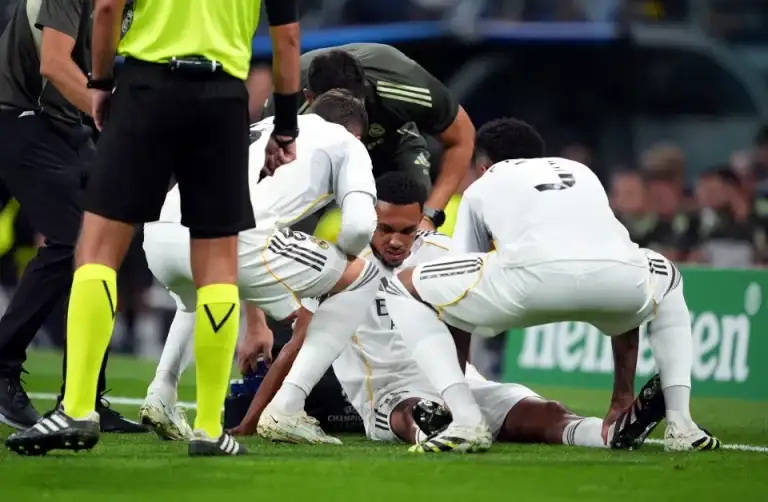Barcelona’s Miami Match Faces Backlash as Critics Say It’s ‘Not Good for Football’

This week has been extremely competitive for the title of “football official with the dumbest thing said.” Florin Prunea, a former Romanian international who is now a UEFA delegate, described Jurgen Klopp as a “circus” act who was “chewing bricks with his teeth.”
Just long enough to say, “Yes, Mr. President, you can move World Cup games despite rules very clearly saying you have no right to do so,” FIFA chief Gianni Infantino took his nose off Trump’s arse.
The president of the Spanish football organisation, Rafael Louzan, however, said the most umwise thing this week. Some strange remarks are accepted in Spain.
The president of La Liga, who openly supports Real Madrid (which seems strange), Javier Tebas, is never far from a microphone.
He is always more than willing to blame Barcelona, or if he really wants to dig the boot in, Manchester City and PSG.
The league’s most recent strategy makes it apparent that, despite his criticism of the state-funded clubs’ limitless financial resources, he would gladly do the same if the tables were turned.
Trending
Barcelona will go to Villarreal on Matchday 17 of the La Liga season for a typical league match; except, they will travel 7,500 kilometres west to Miami rather than the 250 km south.
It has been a long time coming for this fixture, which was first revealed earlier this month. Saudi Arabia has hosted the Supercopa de España, Spain’s equivalent of the Community Shield, since 2020.
Miami is presently home to Barcelona’s most famous player, and the two teams have played four preseason friendlies there.
The NFL, which has played games in the UK, Germany, Brazil, and Ireland and will soon host others in Spain and Australia, is the most obvious example of a sport that has stolen this concept.
However, everyone in Europe agrees on the rationale behind the foundation’s creation: apprehension about the Premier League. A Premier League club’s average revenue for the 2023–2024 season was €7.26 billion, according to Deloitte research.
La Liga and the Bundesliga, by contrast, are valued at €3.8 billion. With €2.6 billion, Ligue 1 has the lowest value, while Serie A teams have €2.9 billion.
Although Tebas has frequently warned that the Premier League bubble will burst, the top division in England has already snatched up the greatest managers and players available.
This transfer window, a freshly promoted team acquired the number nine from four-time Champions League winners Ajax, proving that it’s not only the big boys.
The European Super League, a roughly closed-shop competition for Europe’s elites that would ensure the 12 founding members a steady income, was an attempt by outsiders to cut off the head of this particular rattlesnake in 2021. The Premier League problem has been growing for decades.
Although it was presented as clubs losing faith in UEFA, the true goal was to establish this as the new Premier League. Many executives lost their jobs as a result, and it blew up in their faces spectacularly.
La Liga and Serie A, however, have been searching for methods to increase their revenue ever since the protesting fans had gone home.
The Villarreal vs. Barcelona match in Miami was announced just days after the Italian football association approved a Milan vs. Como Serie A match to be held in Perth, Australia, only 13,700 km away from the actual location.
Back to Rafael Louzan, the head of the Spanish Football Federation. “Good for football,” Louzán said in support of the Miami game.
He even went so far as to refer to it as a “reward” for “the Spanish La Liga matches” supporters who live abroad. When does it stop being Spanish, though?
Louzan’s case swiftly unravels, putting aside the athletic worries that Villarreal is losing a home game and that both sets of players now have two long-haul flights on their schedules.
Louzan is attempting to convey that the league and the teams are not interested in making money from this game, but rather in “rewarding” the supporters of the team, which is, let’s face it, absurd.
They are doing this because executives from all over the world want a piece of the action ahead of the World Cup next year, and the US is one of the largest markets in the world.

But Is it “good” for Perth Glory if their local supporters are debating whether to see Milan at home or visit them on the road?
What is the purpose of these large European teams visiting the A-League and displacing their rivals?
What are the benefits of forcing Villarreal supporters who have been attending El Madrigal for years to watch a “home” game on television? What will happen to the bars and eateries in Milan and the city that will be closing for one weekend due to matchday fans?
La Liga and Serie A will use the NFL as an excuse, but the two sports’ cultures couldn’t be more dissimilar. Twenty NFL teams have relocated to completely new cities since the league’s founding in 1920, and because of the breadth of the nation, teams frequently travel great distances.
Aside from the NFL, American football isn’t really played in Europe, according to the European League of Football.
There is a legitimate argument that it is not “good for football” for Barcelona or Milan to move into these places and snatch up all the fans; in fact, it is detrimental to the teams that are already there and are attempting to expand their fan base.
It’s also troubling how easily this has been passed through. Real Madrid is the only team that has actually opposed it, claiming that it would result in a “before and after” for football in a surreal universe where they are somehow the good guys.
FIFA and UEFA have been ineffectual by claiming that it is outside of their control and falls under someone else’s jurisdiction.
Aleksander Čeferin, the president of UEFA, attempted to argue that it doesn’t establish a “precedent,” but that is just not how precedent operates.
All of this reminds us of Madrid’s initial statement about a “before and after” time in football.
It feels like the beginning of a slippery slope where this becomes the norm, although it might never happen in the Premier League or the Bundesliga, where supporters are more outspoken in their grievances.
This raises an existential question: If a football team isn’t a representation of its community, what is it? It’s possible that most Barcelona supporters who attend the Miami match have never visited the city, seen Camp Nou, or understood what it means to be a Catalan.
Representing the supporters and those who helped the team become what it is should be the goal of football, but it can be challenging when they live 7,500 kilometres away.
I apologise, Louzan. While this could be excellent for your finances, don’t try to convince us that it’s good for football.






